Related Research Articles
Alex or Aleck Miller, known later in his career as Sonny Boy Williamson, was an American blues harmonica player, singer and songwriter. He was an early and influential blues harp stylist who recorded successfully in the 1950s and 1960s. Miller used various names, including Rice Miller and Little Boy Blue, before calling himself Sonny Boy Williamson, which was also the name of a popular Chicago blues singer and harmonica player. To distinguish the two, Miller has been referred to as Sonny Boy Williamson II.

Five Live Yardbirds is the live debut album by English rock band the Yardbirds. It features the group's interpretations of ten American blues and rhythm and blues songs, including their most popular live number, Howlin' Wolf's "Smokestack Lightning". The album contains some of the earliest recordings with guitarist Eric Clapton.
The Real Folk Blues is a series of blues albums released between 1965 and 1967 by Chess Records, later reissued MCA Records. Each album in the series highlighted the music of one major Chess artist, including John Lee Hooker, Howlin' Wolf, Muddy Waters, and Sonny Boy Williamson II. The series, overseen by Marshall Chess, was a reaction to the increasing audience for the blues following the British Invasion. Companion discs, titled More Real Folk Blues, were released for many of the artists. Hooker's companion disc was not released until 1991. Beginning in 1999 the albums were re-released as single-disc compilations.
The American Folk Blues Festival was a music festival that toured Europe as an annual event for several years beginning in 1962. It introduced audiences in Europe, including the UK, to leading blues performers of the day such as Muddy Waters, Howlin' Wolf, John Lee Hooker and Sonny Boy Williamson, most of whom had never previously performed outside the US. The tours attracted substantial media coverage, including TV shows, and contributed to the growth of the audience for blues music in Europe.

"Bring It On Home" is a blues song written by American music arranger and songwriter Willie Dixon. Sonny Boy Williamson II recorded it in 1963, but the song was not released until 1966. Led Zeppelin adapted it in part as a homage to Williamson in 1969 and subsequently, the song has been recorded by several artists.
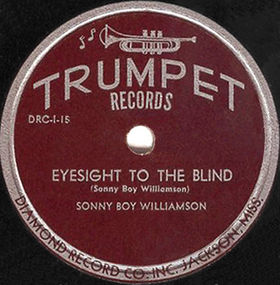
"Eyesight to the Blind" is a 12-bar blues song written and recorded in 1951 by Sonny Boy Williamson II. He also recorded the related songs "Born Blind", "Unseeing Eye", "Don't Lose Your Eye", and "Unseen Eye" during his career. The Larks, an American rhythm and blues group, recorded the song, which reached number five on the R&B charts in 1951. Several musicians subsequently recorded it in a variety of styles. The Who used Williamson's lyrics for their adaptation for the rock opera Tommy.
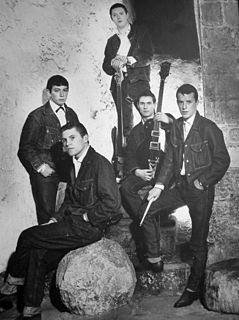
The discography of The Animals, an English music group of the 1960s formed in Newcastle upon Tyne, contains 20 studio albums, six compilation albums, five EPs and 25 singles. Featuring a gritty, bluesy sound and a deep-voiced frontman in Eric Burdon, they are best known for their rendition of an American folk song named "House of the Rising Sun", which is described by many as their signature song. This single had worldwide sales of nearly 5 million and became a Number One hit in both the UK and US in 1964. Overall, the group balanced tough, rock-edged pop singles such as "We Gotta Get Out of This Place" and "It's My Life" against rhythm and blues–oriented album material. The Animals released separate UK and US albums, a practice common to other British Invasion bands of the time such as The Beatles and The Rolling Stones.

Alan Glen is a British blues harmonica player, best known for his work with The Yardbirds, Nine Below Zero, Little Axe, and his own bands, The Barcodes and The Incredible Blues Puppies.

Sonny Boy Williamson & the Yardbirds is a live album by Chicago blues veteran Sonny Boy Williamson II backed by English rock band the Yardbirds. It was recorded at the Crawdaddy Club in Richmond, Surrey on December 8, 1963. However, the performances were not released until early 1966, after a string of Top 40 hits by the Yardbirds.
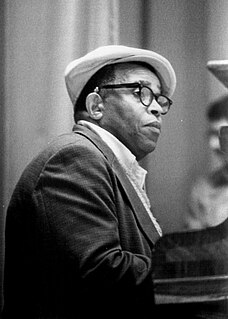
Lafayette Leake was an American blues and jazz pianist, organist, vocalist and composer who played for Chess Records as a session musician, and as a member of the Big Three Trio, during the formative years of Chicago blues. He played piano on many of Chuck Berry's recordings.
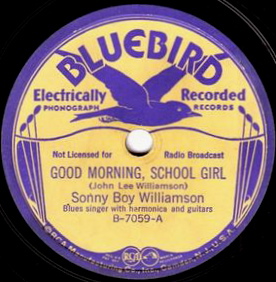
"Good Morning, School Girl" is a blues standard which has been identified as an influential part of the blues canon. Pre-war Chicago blues vocalist and harmonica pioneer John Lee "Sonny Boy" Williamson first recorded it in 1937. Subsequently, a variety of artists have recorded versions of the song, usually calling it "Good Morning Little Schoolgirl".

"The Sky Is Crying" is a blues standard written and initially recorded by Elmore James in 1959. Called "one of his most durable compositions", "The Sky Is Crying" became a R&B record chart hit and has been interpreted and recorded by numerous artists.
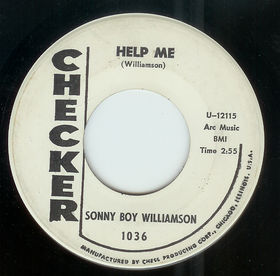
"Help Me" is a blues standard first recorded by Sonny Boy Williamson II in 1963. The song, a mid-tempo twelve-bar blues, is credited to Williamson, Willie Dixon, and Ralph Bass and is based on the 1962 instrumental hit "Green Onions" by Booker T. and the MGs. "Help Me" became a hit in 1963 and reached number 24 in the Billboard R&B chart.
Little Sonny is an American electric blues harmonica player, singer and songwriter. His early mentor and inspiration was Sonny Boy Williamson II. Nevertheless, Little Sonny stated that his nickname was originated by his mother: "[She] called me 'Sonny boy' from the time I can remember." He has released eight albums, including three for a subsidiary of Stax Records. His 1973 release, Hard Goin' Up, reached the Top 50 in the Billboard R&B chart.
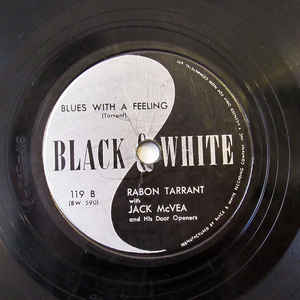
"Blues with a Feeling" is a blues song written and first recorded by Rabon Tarrant with Jack McVea and His All Stars in 1947, as the B-side of "Slowly Goin' Crazy Blues". Although the original release was commercially unsuccessful, the song later became an important hit for Little Walter, with whom it is usually identified.
"Checkin' Up on My Baby" is a song recorded by Sonny Boy Williamson II in 1960 that has become a classic of the blues. The song was not released as a single, but was included on Williamson's The Real Folk Blues album released after his death in 1965. The song has been recorded by numerous blues and other artists, making it one of Williamson's most recorded songs.

"Don't Start Me Talkin'" is a blues song written and performed by Sonny Boy Williamson II. It was Williamson's first single recorded for Checker Records, and reached number three in the US Billboard R&B chart in 1955.
"Early in the Morning" is a blues song that was recorded by Sonny Boy Williamson I in 1937. Identified as a blues standard, it was inspired by earlier blues songs. "Early in the Morning" has been recorded by numerous musicians, including Junior Wells, who made it part of his repertoire.

The Yardbirds are an English rock band, formed in London in 1963. The band's core lineup featured vocalist and harmonica player Keith Relf, drummer Jim McCarty, rhythm guitarist/bassist Chris Dreja and bassist/producer Paul Samwell-Smith. The band is known for starting the careers of three of rock's most famous guitarists, Eric Clapton, Jimmy Page, and Jeff Beck, all of whom ranked in the top five of Rolling Stone magazine's list of 100 greatest guitarists. The band had a string of hits throughout the mid-1960s, including "For Your Love", "Heart Full of Soul", "Shapes of Things", and "Over Under Sideways Down".

The Real Folk Blues is an album by blues musician Sonny Boy Williamson II compiling songs recorded in Chicago between 1957 and 1964. Released by Chess Records in 1966, the album contains mostly previously unissued material, including "Checkin' Up on My Baby" and "Bring It On Home", which have been called "some of the most accomplished masterpieces of postwar blues".
References
- ↑ "More Real Folk Blues - Sonny Boy Williamson II | Songs, Reviews, Credits". AllMusic . Retrieved May 25, 2021.
- ↑ Whitburn, Joel (1988). "Sonny Boy Williamson". Top R&B Singles 1942–1988. Menomonee Falls, Wisconsin: Record Research. p. 447. ISBN 0-89820-068-7.
- ↑ Humphrey, Mark (1993). The Essential Sonny Boy Williamson (Album notes). Sonny Boy Williamson II. MCA/Chess Records. p. 22. CHD2-9343.
- ↑ "Bye Bye Bird - Sonny Boy Williamson II | Song Info". AllMusic . Retrieved May 25, 2021.
- ↑ Unterberger, Richie. "Sonny Boy Williamson & the Yardbirds – Review". AllMusic . Retrieved November 29, 2020.
- ↑ "The Moody Blues: 'Bye Bye Bird' –Appears On". AllMusic . Retrieved November 29, 2020.